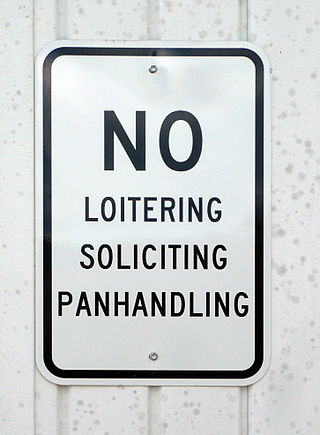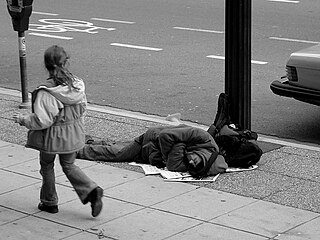
Indecent exposure is the deliberate public exposure by a person of a portion of their body in a manner contrary to local standards of appropriate behavior. Laws and social attitudes regarding indecent exposure vary significantly in different countries. It ranges from outright prohibition of the exposure of any body parts other than the hands or face to prohibition of exposure of certain body parts, such as the genital area, buttocks or breasts.

Abortion in the United Kingdom is de facto available under the terms of the Abortion Act 1967 in Great Britain and the Abortion (No.2) Regulations 2020 in Northern Ireland. The procurement of an abortion remains a criminal offence in Great Britain under the Offences Against the Person Act 1861, although the Abortion Act provides a legal defence for both the pregnant woman and her doctor in certain cases. Although a number of abortions did take place before the 1967 Act, there have been around 10 million abortions in the United Kingdom. Around 200,000 abortions are carried out in England and Wales each year and just under 14,000 in Scotland; the most common reason cited under the ICD-10 classification system for around 98% of all abortions is "risk to woman's mental health."

The Buggery Act 1533, formally An Acte for the punishment of the vice of Buggerie, was an Act of the Parliament of England that was passed during the reign of Henry VIII.
In England and Wales, the sus law was a stop and search law that permitted a police officer to stop, search and potentially arrest people on suspicion of them being in breach of section 4 of the Vagrancy Act 1824. According to a 2018 study in the British Journal of Criminology, stop and search had a marginal impact on crime in the UK.

The Sexual Offences Act 2003 is an Act of the Parliament of the United Kingdom.

The Obscene Publications Act 1857, also known as Lord Campbell's Act or Campbell's Act, was a piece of legislation in the United Kingdom of Great Britain and Ireland dealing with obscenity. For the first time, it made the sale of obscene material a statutory offence, giving the courts power to seize and destroy offending material. The Act superseded a 1787 Royal Proclamation by George III titled Proclamation for the Discouragement of Vice. The proclamation commanded the prosecution of those guilty of "excessive drinking, blasphemy, profane swearing and cursing, lewdness, profanation of the Lord's Day, and other dissolute, immoral, or disorderly practices". Prior to this Act, the "exposure for sale" of "obscene books and prints" had been made illegal by the Vagrancy Act 1824. but the publication of obscene material was a common law misdemeanour The effective prosecution of authors and publishers was difficult even in cases where the material was clearly intended as pornography.

The Offences against the Person Act 1861 is an Act of the Parliament of the United Kingdom of Great Britain and Ireland. It consolidated provisions related to offences against the person from a number of earlier statutes into a single Act. For the most part these provisions were, according to the draftsman of the Act, incorporated with little or no variation in their phraseology. It is one of a group of Acts sometimes referred to as the Criminal Law Consolidation Acts 1861. It was passed with the object of simplifying the law. It is essentially a revised version of an earlier consolidation act, the Offences Against the Person Act 1828, incorporating subsequent statutes.

In Great Britain, the act of engaging in sex as part of an exchange of various sexual services for money is legal, but a number of related activities, including soliciting in a public place, kerb crawling, owning or managing a brothel, pimping and pandering, are illegal. In Northern Ireland, which previously had similar laws, paying for sex became illegal from 1 June 2015.
The law of Northern Ireland is the legal system of statute and common law operating in Northern Ireland since the partition of Ireland established Northern Ireland as a distinct jurisdiction in 1921. Prior to 1921, Northern Ireland was part of the same legal system as the rest of Ireland.

The Sexual Offences Act 1967 is an act of Parliament in the United Kingdom. It legalised homosexual acts in England and Wales, on the condition that they were consensual, in private and between two men who had attained the age of 21. The law was extended to Scotland by the Criminal Justice (Scotland) Act 1980 and to Northern Ireland by the Homosexual Offences Order 1982.
Section 11 of the Criminal Law Amendment Act 1885, commonly known as the Labouchere Amendment, made "gross indecency" a crime in the United Kingdom. In practice, the law was used broadly to prosecute male homosexuals where actual sodomy could not be proven. The penalty of life imprisonment for sodomy was also so harsh that successful prosecutions were rare. The new law was much more enforceable. Section 11 was repealed and re-enacted by section 13 of the Sexual Offences Act 1956, which in turn was repealed by the Sexual Offences Act 1967, which partially decriminalised male homosexual behaviour.

Loitering is the act of standing or waiting around idly without purpose in some public places.

The Criminal Law Act 1967 is an Act of the Parliament of the United Kingdom that made some major changes to English criminal law, as part of wider liberal reforms by the Labour government elected in 1966. Most of it is still in force.

The Interpretation Act 1978 is an act of the Parliament of the United Kingdom. The Act makes provision for the interpretation of Acts of Parliament, Measures of the General Synod of the Church of England, Measures of the Church Assembly, subordinate legislation, "deeds and other instruments and documents", Acts of the Scottish Parliament and instruments made thereunder, and Measures and Acts of the National Assembly for Wales and instruments made thereunder. The Act makes provision in relation to: the construction of certain words and phrases, words of enactment, amendment or repeal of Acts in the Session they were passed, judicial notice, commencement, statutory powers and duties, the effect of repeals, and duplicated offences.

The Criminal Justice (Scotland) Act 1980 is an act of Parliament in the United Kingdom. Most of the act's provisions were merely a consolidation of already existing legislation, and as such subject to little controversy, with the notable exception was section 80, which partially decriminalised private homosexual acts between consenting adults in Scotland.

Vagrancy is the condition of wandering homelessness without regular employment or income. Vagrants usually live in poverty and support themselves by travelling while engaging in begging, scavenging, petty theft. Historically, vagrancy in Western societies was associated with petty crime, begging and lawlessness, and punishable by law with forced labor, military service, imprisonment, or confinement to dedicated labor houses.

Anti-homelessness legislation can take two forms: legislation that aims to help and re-house homeless people; and legislation that is intended to send homeless people to homeless shelters compulsorily, or to criminalize homelessness and begging.

A sodomy law is a law that defines certain sexual acts as crimes. The precise sexual acts meant by the term sodomy are rarely spelled out in the law, but are typically understood and defined by many courts and jurisdictions to include any or all forms of sexual acts that are deemed to be "illegal", "illicit", "unlawful", "unnatural" and/or "immoral". Sodomy typically includes anal sex, oral sex, manual sex, and bestiality. In practice, sodomy laws have rarely been enforced to target against sexual activities between individuals of the opposite sex, and have mostly been used to target against sexual activities between individuals of the same sex.

The Coroners and Justice Act 2009 is an Act of the Parliament of the United Kingdom. It changed the law on coroners and criminal justice in England and Wales.

The Vagrancy Act 1898 was a piece of legislation in England and Wales that criminalised men who lived off the earnings of prostitution (pimping) and who solicited in public places. The bill was generally viewed as successful in its impact, leading to the similar Immoral Traffic (Scotland) Act.










